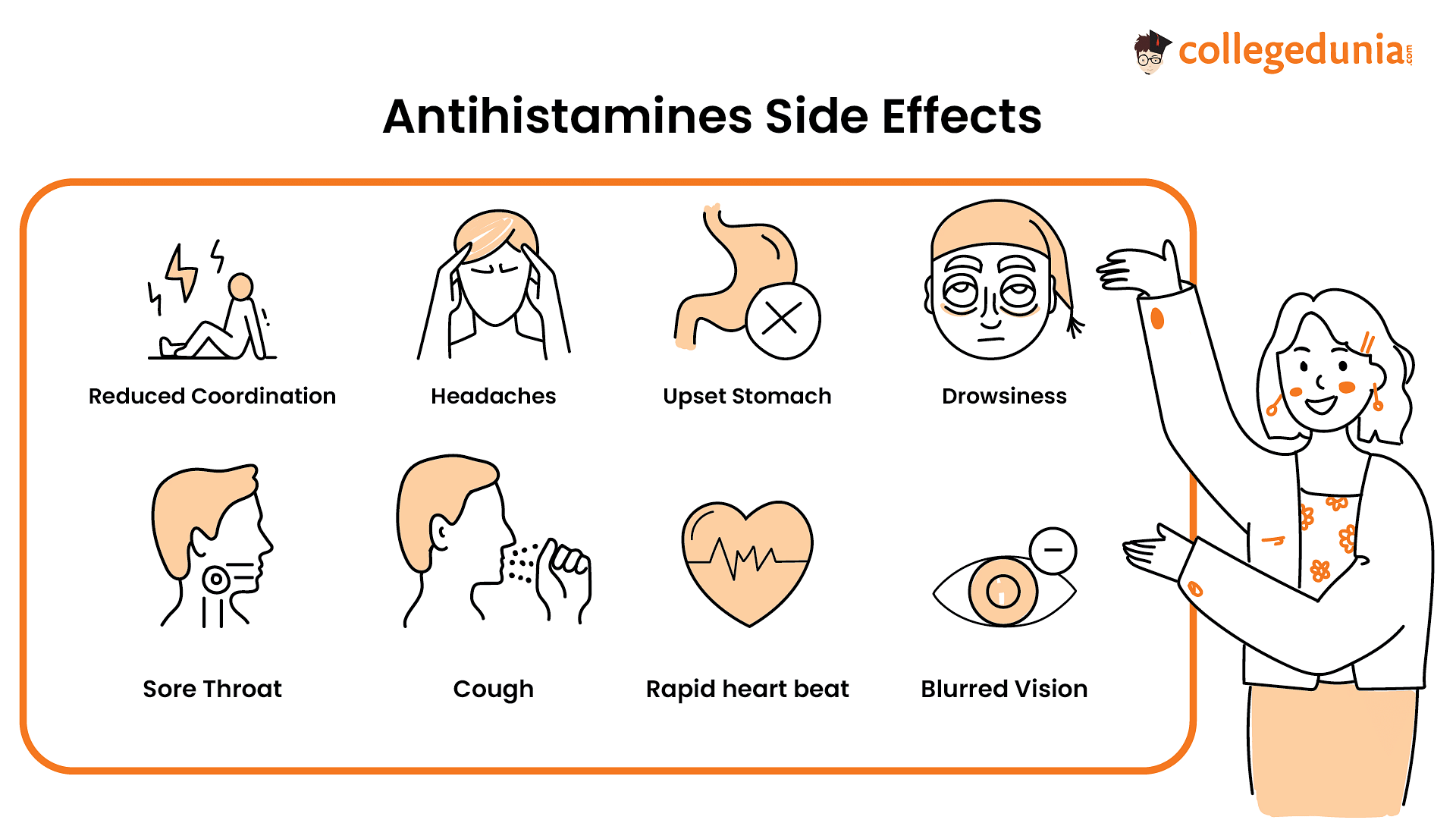Which of the following is an antihistamine drug?
Show Hint
Chlorpheniramine helps control the symptoms of colds or allergies.
- Chloropheniramine
- Ciprofloxacin
- Chloramphenicol
- Chloroquine
The Correct Option is A
Approach Solution - 1
Chlorpheniramine helps control the symptoms of colds or allergies. Chlorpheniramine is in a class of medications called antihistamines. It works by blocking the action of histamine which is a substance in the body that causes allergic symptoms.
Chloropheniramine: antihistamine
Ciprofloxacin: antibiotic
Chloramphenicol: broad-spectrum antibiotic
Chloroquine: antimalarial.
Discover More Chapter: Drugs
Approach Solution -2
The Correct Answer is (A)
Real Life Applications
1. Diphenhydramine: Diphenhydramine is a first-generation antihistamine that is used to treat allergies, hay fever, and motion sickness. It is also used as a sleep aid.
2. Loratadine: Loratadine is a second-generation antihistamine that is used to treat allergies, hay fever, and hives. It is less sedating than diphenhydramine.
3. Cetirizine: Cetirizine is a second-generation antihistamine that is used to treat allergies, hay fever, and hives. It is also available as a non-drowsy version.
4. Fexofenadine: Fexofenadine is a second-generation antihistamine that is used to treat allergies, hay fever, and hives. It is also available as a non-drowsy version.

Question can also be asked as
1. What is an antihistamine drug?
2. What are some examples of antihistamine drugs?
3. How do antihistamine drugs work?
4. What are the side effects of antihistamine drugs?
Approach Solution -3
The Correct Answer is (A)
Drugs are synthetically prepared chemicals that physiologically affect all living beings when taken.
- Different types of drugs have different actions and each interacts with a specific part of the body.
- Some drugs are toxic for living beings.
Types of Drugs
- Antacids: These drugs act like bases and neutralize the acid present in the stomach and make its Ph value more neutral.
- Antihistamines: These are used to treat acute diseases like allergic rhinitis, common cold, influenza, nasal congestion, or sneezing.
- Neurologically Active Drugs: These drugs are used to treat stress, fatigue, provide relief from pain in the body, mild, and severe mental diseases.
- Antimicrobials: These are chemical substances that suppress the growth of or kill microorganisms including fungi, bacteria, protozoa, and viruses.
- Antifertility Drugs: These drugs are used to avoid population growth and help in family planning.
Top Questions on Chemistry in Everyday Life
Given below are two statements:
Statement I: D-(+)-glucose + D-(+)-fructose $\xrightarrow{H_2O}$ sucrose sucrose $\xrightarrow{\text{Hydrolysis}}$ D-(+)-glucose + D-(+)-fructose
Statement II: Invert sugar is formed during sucrose hydrolysis.
In the light of the above statements, choose the correct answer from the options given below -- JEE Main - 2025
- Chemistry
- Chemistry in Everyday Life
- What is the pH of a 0.01 M solution of HCl?
- BITSAT - 2025
- Chemistry
- Chemistry in Everyday Life
- Arrange the following in the increasing order of oxidation number of nitrogen
A. N$_2$O
B. NO$_3^-$
C. NO
D. NO$_2$- TS EAMCET - 2025
- Chemistry
- Chemistry in Everyday Life
- Which of these separation technique pairs is correctly matched?
- AIIMS Paramedical - 2025
- Chemistry
- Chemistry in Everyday Life
- Which of the following is an example of antifertility drug?
- TS EAMCET - 2025
- Chemistry
- Chemistry in Everyday Life
Concepts Used:
Chemistry in Everyday Life
The scientific study of matter’s properties and behaviour is known as chemistry. It is a natural science that studies the elements that makeup matter, as well as the compounds, made up of atoms, molecules, and ions: their composition, structure, qualities, and behaviour, as well as the changes that occur when they mix with other things.
- Importance of Chemistry in Food - Chemicals are the fundamental components of everything. Chemical molecules make up all food, including carbs, vitamins, lipids, proteins, and fibre, which are all safe and often desirable.
- Importance of Chemistry in Medicines - Medicines or pharmaceuticals are chemical substances that are used to treat diseases and relieve pain. Chemistry has made significant contributions to health care. Chemistry, for example, aids in the manufacture and application of surgical materials.
- Importance of Chemistry in Cosmetics - In our daily lives, we use lotions, fragrances, talcum powder, and a variety of other cosmetic goods. All of these items are developed in laboratories using chemicals for our health and skin.
- Importance of Chemistry in Soaps and Detergents - Soaps are sodium and potassium salts of fatty acids with greater molecular weights, such as stearic acid, palmitic acid, and oleic acid. Sodium salts of long-chain alkyl hydrogen sulphates or sodium salts of long-chain alkyl benzene sulphonic acids are commonly used as detergents.